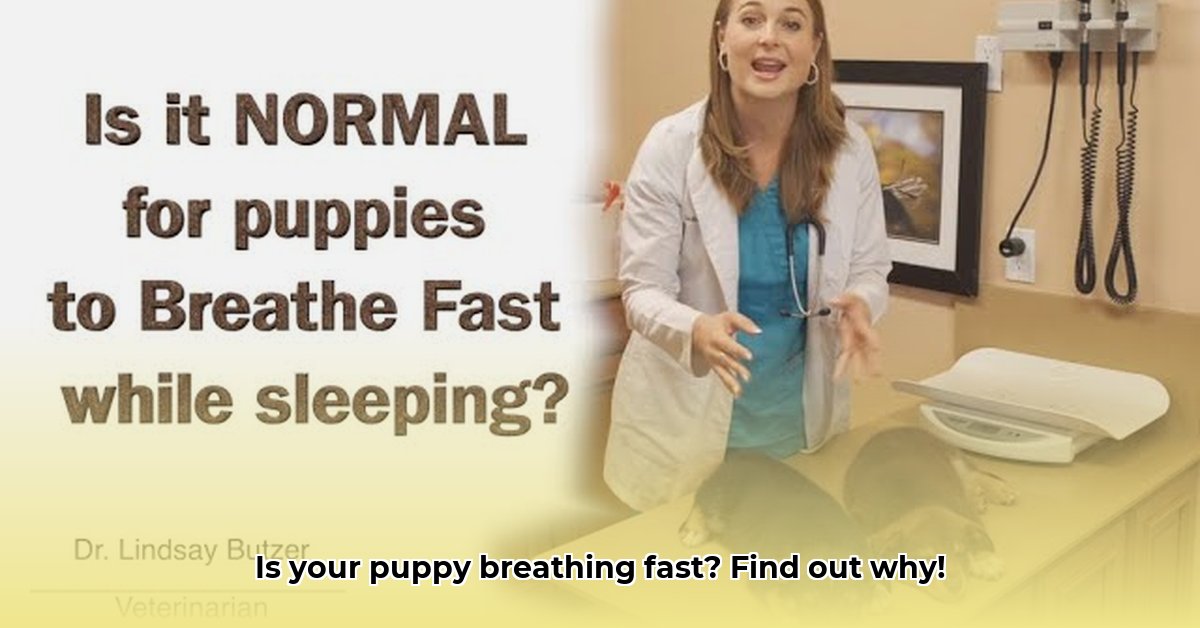Seeing your puppy breathing fast can be worrying. Sometimes it’s nothing to fret about, like after a playful romp or on a hot day. But other times, rapid breathing can mean something’s wrong. This guide will help you figure out why your puppy is breathing quickly – from simple things to more serious health problems. We’ll cover what normal puppy breathing looks like, the signs that something’s seriously wrong, common causes like infections or heart issues, and what to do if you’re concerned. We’ll also show you how to tell if it’s a big deal and how to keep your puppy breathing easy. For similar issues in cats, see this helpful guide on cat breathing problems. Let’s get you the information you need to keep your furry friend healthy and happy.
Do Puppies Breathe Fast? A Parent’s Guide to Puppy Breathing
Many new puppy parents worry about their little one’s breathing. It’s completely understandable! Puppies, especially tiny ones, breathe differently than adult dogs. So, is your puppy’s rapid breathing cause for concern, or is it simply part of the adorable puppy package? Let’s explore the world of puppy breaths, understanding fast breathing in puppies.
Puppy Pants: When is it Normal?
Believe it or not, fast breathing isn’t always a red flag. Think of it like this: a puppy’s lungs are like tiny engines. They’re still developing, and they have to work a bit harder than a grown-up dog’s lungs. A normal breathing rate for puppies ranges from around 15 to 40 breaths a minute while resting. That’s a pretty wide range, right? Several factors affect this number. For example, a playful puppy running around will naturally breathe faster than a sleepy puppy napping in a sunbeam. Just like when we exert ourselves and need more oxygen, your puppy’s breathing speeds up during playtime or when feeling excited. Even the weather plays a role: a hot day can increase their breathing rate as they pant to cool down.
However, if your puppy is breathing rapidly even when resting or in a cool environment, it’s time to pay closer attention. This is especially important if the rapid breathing is accompanied by other symptoms. Did you know that a puppy’s breathing rate can more than double during exercise compared to its resting rate? Small breed puppies often have a naturally faster respiratory rate compared to larger breeds.
When Fast Breathing Means “Something’s Up”
Sometimes, rapid breathing is a sign something needs to be checked. Picture your puppy’s body as a complex machine. When a part isn’t working quite right, the respiratory system is one of the first systems to show its distress. Various things can cause a puppy to breathe quickly, signaling potential puppy respiratory distress:
- Overheating (Heatstroke): This is particularly serious for short-nosed breeds (like Bulldogs or Pugs). Their noses aren’t designed for efficient cooling, so they overheat more easily. The brachycephalic airway syndrome in these breeds complicates breathing even further. Think of it like trying to breathe through a tiny straw – it’s tough! Ensure your puppy always has access to fresh, cool water and a shady spot, especially during warmer months.
- Respiratory Infections: Puppies can catch all sorts of nasty things, from kennel cough (a common contagious infection caused by Bordetella bronchiseptica and other pathogens) to pneumonia. These infections often lead to more rapid and sometimes labored breathing. It’s similar to when we get a nasty cold and find ourselves breathing heavily. Regular vaccinations are crucial in preventing many of these infections.
- Heart Trouble: Problems with your puppy’s heart, such as congenital heart defects or heartworm disease, can make delivering oxygen to the body less efficient, which then leads to rapid and shallow breaths. Their tiny hearts have to work extra hard to compensate. A veterinarian can often detect heart murmurs during routine check-ups, which could indicate an underlying heart condition.
- Anemia: Anemia is when the blood lacks enough red blood cells to carry sufficient oxygen. This forces the puppy’s breathing system to work overtime, causing faster, more frequent breaths. Common causes of anemia in puppies include parasite infestations (fleas, ticks, worms), ingestion of toxins (like onions or garlic), or underlying diseases.
- Diaphragmatic Hernia: This is a more serious condition where there’s a tear in the diaphragm (the muscle separating the chest and abdomen), often due to trauma. This can interfere with your puppy’s ability to breathe correctly, as abdominal organs may move into the chest cavity. This typically requires surgical correction.
- Pain: Puppies experiencing pain, whether from an injury, surgery, or underlying medical condition, may exhibit rapid breathing. This is due to the body’s stress response and increased metabolic demands.
- Allergies: Allergic reactions can cause inflammation in the airways, leading to difficulty breathing and rapid respiration. These reactions can be triggered by insect bites, food, or environmental allergens.
- Pneumonia: This inflammation of the lungs can be caused by bacterial, viral, or fungal infections and can result in difficulty breathing, coughing, and rapid breathing.
- Poisoning: Ingestion of toxins can affect various bodily functions and directly impact respiratory function, leading to rapid breathing.
More Than Just Fast Breaths: Recognizing Warning Signs
It’s not just about the breathing speed; other symptoms paint a clearer picture. So, pay attention to the whole picture, not just the breathing. Here are some extra clues of puppy respiratory problems to watch:
- Sluggishness/Lethargy: A normally energetic puppy suddenly becoming lethargic is a crucial warning sign. This can indicate that the body isn’t getting enough oxygen or is fighting an infection.
- Coughing: Persistent coughing, whether dry or productive (with mucus), is often a sign of a respiratory problem. It’s always better to get it checked out.
- Pale Gums: Pale gums can suggest anemia or poor circulation, both requiring veterinary attention. Healthy gums should be a bubblegum pink color.
- Bluish Gums (Cyanosis): This is a serious emergency! Bluish gums indicate a lack of oxygen in the blood, and immediate veterinary care is absolutely necessary. This requires immediate action.
- Visible Breathing Difficulty: Is your puppy struggling to catch their breath, gasping, or making noticeable efforts to inhale? Look for exaggerated chest and abdominal movements. This is a serious situation that requires immediate veterinary attention.
- Nasal Discharge: Discharge from the nose, especially if it’s discolored (yellow or green) or bloody, can be a sign of a respiratory infection.
- Wheezing or Noisy Breathing: Any abnormal sounds during breathing should be evaluated by a veterinarian.
- Loss of Appetite: A decreased appetite can be a sign that your puppy isn’t feeling well and could indicate an underlying health problem.
- Fever: A fever (rectal temperature above 102.5°F) is a sign that your puppy’s body is fighting an infection.
What to Do (and When to Panic Slightly!)
If you notice any of the above symptoms along with rapid breathing, don’t delay. Call your vet immediately. Early diagnosis and treatment are critical for many respiratory and heart conditions in puppies. When it comes to your puppy’s health, acting quickly is vital. Time is of the essence. Remember, a quick call is always better than a delayed diagnosis if it could make a difference. If you suspect your puppy ingested a toxin, contact your veterinarian or the ASPCA Animal Poison Control Center immediately.
Prevention is Better Than Cure: Your Puppy’s Healthcare
Regular vet checkups are your best ally. Vaccines protect against many infections, and parasite control helps keep your puppy healthy and strong. These preventative measures can prevent many problems before they even arise, saving both your puppy from suffering and you from potential vet bills. Getting ahead of potential health problems is always a good plan. Ensure your puppy is on a veterinarian-approved heartworm and flea/tick preventative.
A Quick Cheat Sheet for Concerned Puppy Parents
Here’s a handy guide to help you decide your next steps:
| Symptom | Possible Cause(s) | What to Do |
|---|---|---|
| Rapid breathing, otherwise healthy | Excitement, Exercise, Warm Weather | Offer a cool place, fresh water, let them rest, and monitor their breathing. If breathing doesn’t return to normal within 30 minutes, contact your veterinarian. |
| Rapid breathing + lethargy | Infection, Heart problems, Anemia | Contact your veterinarian immediately. |
| Rapid breathing + pale gums | Anemia, Internal bleeding | Contact your veterinarian immediately. |
| Rapid breathing + bluish gums | Serious oxygen deprivation (Emergency!) | RUSH to the nearest emergency veterinary clinic IMMEDIATELY! |
| Rapid breathing + coughing | Respiratory infection, Heart disease | Contact your veterinarian immediately. |
| Rapid breathing + nasal discharge | Respiratory infection | Contact your veterinarian immediately. |
Remember, when in doubt, always err on the side of caution. Your puppy’s health is priceless. Don’t hesitate to contact your vet – they’
- Stainless Steel Food Storage for Healthier, Eco-Friendly Meal Prep - February 27, 2026
- Stainless Food Containers Offer Durable Storage for Everyday Meals - February 26, 2026
- Stainless Steel Containers Offer Superior Food Preservation and Durability - February 25, 2026










